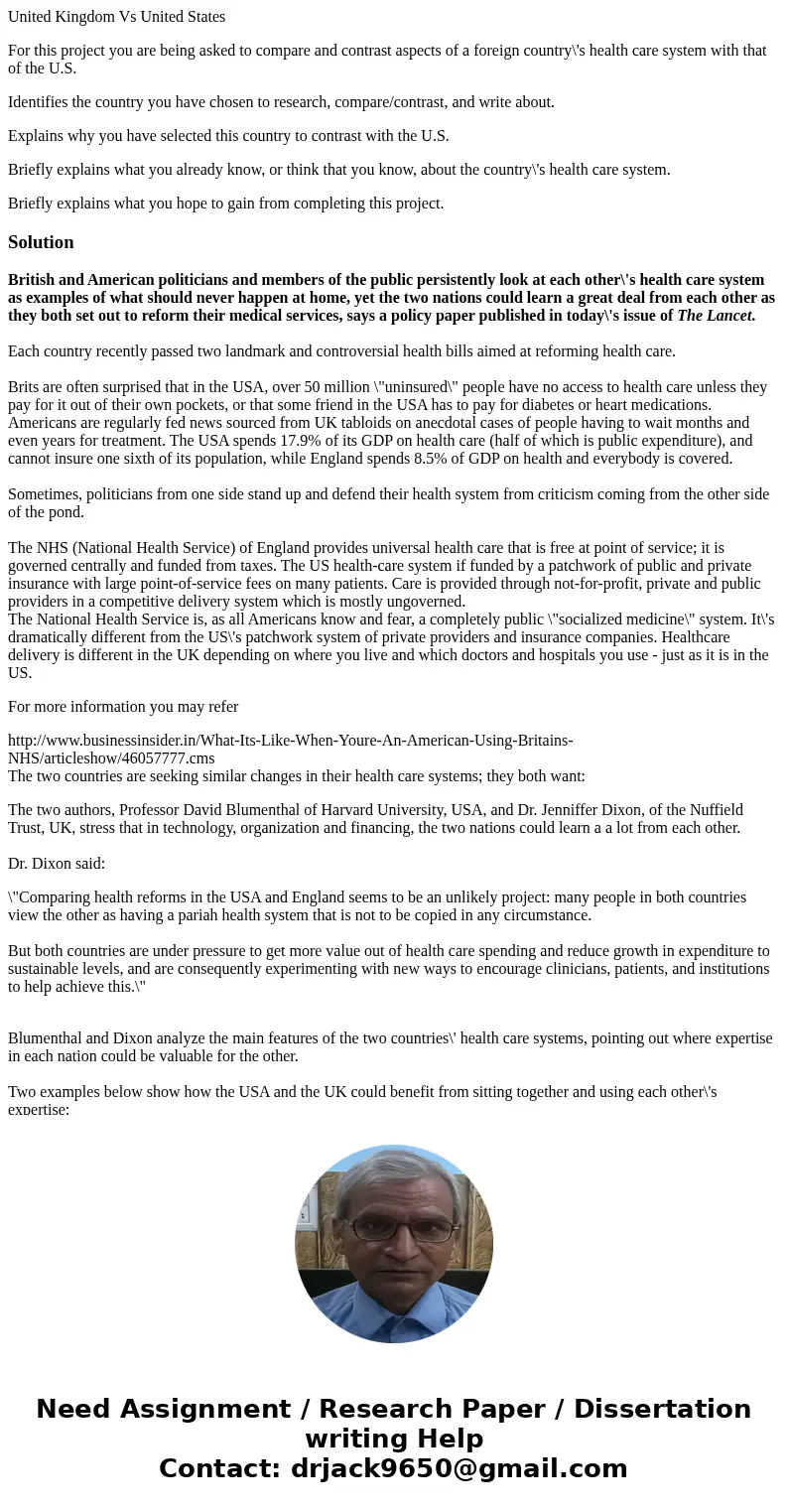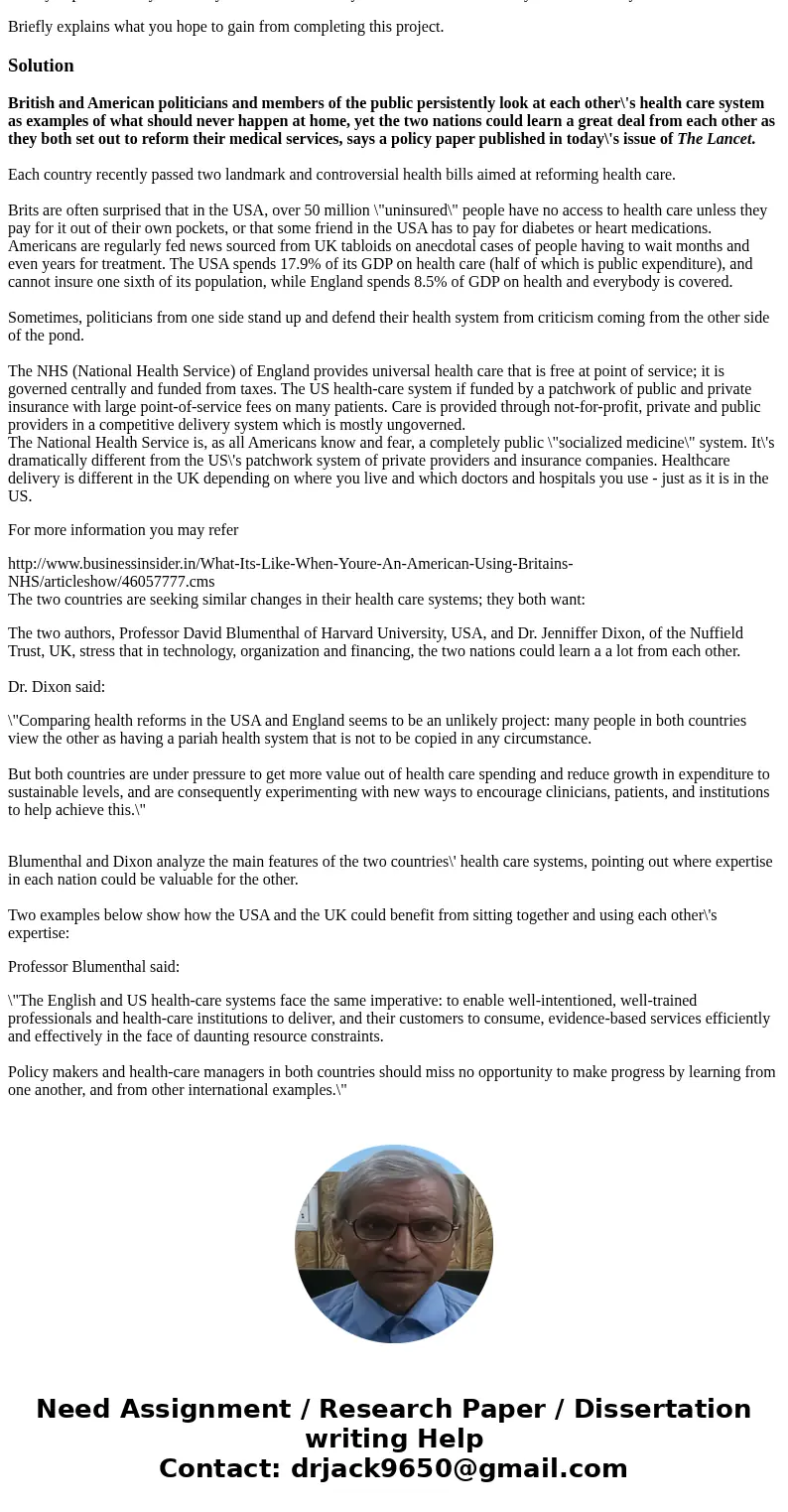United Kingdom Vs United States For this project you are bei
United Kingdom Vs United States
For this project you are being asked to compare and contrast aspects of a foreign country\'s health care system with that of the U.S.
Identifies the country you have chosen to research, compare/contrast, and write about.
Explains why you have selected this country to contrast with the U.S.
Briefly explains what you already know, or think that you know, about the country\'s health care system.
Briefly explains what you hope to gain from completing this project.
Solution
British and American politicians and members of the public persistently look at each other\'s health care system as examples of what should never happen at home, yet the two nations could learn a great deal from each other as they both set out to reform their medical services, says a policy paper published in today\'s issue of The Lancet.
Each country recently passed two landmark and controversial health bills aimed at reforming health care.
Brits are often surprised that in the USA, over 50 million \"uninsured\" people have no access to health care unless they pay for it out of their own pockets, or that some friend in the USA has to pay for diabetes or heart medications. Americans are regularly fed news sourced from UK tabloids on anecdotal cases of people having to wait months and even years for treatment. The USA spends 17.9% of its GDP on health care (half of which is public expenditure), and cannot insure one sixth of its population, while England spends 8.5% of GDP on health and everybody is covered.
Sometimes, politicians from one side stand up and defend their health system from criticism coming from the other side of the pond.
The NHS (National Health Service) of England provides universal health care that is free at point of service; it is governed centrally and funded from taxes. The US health-care system if funded by a patchwork of public and private insurance with large point-of-service fees on many patients. Care is provided through not-for-profit, private and public providers in a competitive delivery system which is mostly ungoverned.
The National Health Service is, as all Americans know and fear, a completely public \"socialized medicine\" system. It\'s dramatically different from the US\'s patchwork system of private providers and insurance companies. Healthcare delivery is different in the UK depending on where you live and which doctors and hospitals you use - just as it is in the US.
For more information you may refer
http://www.businessinsider.in/What-Its-Like-When-Youre-An-American-Using-Britains-NHS/articleshow/46057777.cms
The two countries are seeking similar changes in their health care systems; they both want:
The two authors, Professor David Blumenthal of Harvard University, USA, and Dr. Jenniffer Dixon, of the Nuffield Trust, UK, stress that in technology, organization and financing, the two nations could learn a a lot from each other.
Dr. Dixon said:
\"Comparing health reforms in the USA and England seems to be an unlikely project: many people in both countries view the other as having a pariah health system that is not to be copied in any circumstance.
But both countries are under pressure to get more value out of health care spending and reduce growth in expenditure to sustainable levels, and are consequently experimenting with new ways to encourage clinicians, patients, and institutions to help achieve this.\"
Blumenthal and Dixon analyze the main features of the two countries\' health care systems, pointing out where expertise in each nation could be valuable for the other.
Two examples below show how the USA and the UK could benefit from sitting together and using each other\'s expertise:
Professor Blumenthal said:
\"The English and US health-care systems face the same imperative: to enable well-intentioned, well-trained professionals and health-care institutions to deliver, and their customers to consume, evidence-based services efficiently and effectively in the face of daunting resource constraints.
Policy makers and health-care managers in both countries should miss no opportunity to make progress by learning from one another, and from other international examples.\"


 Homework Sourse
Homework Sourse